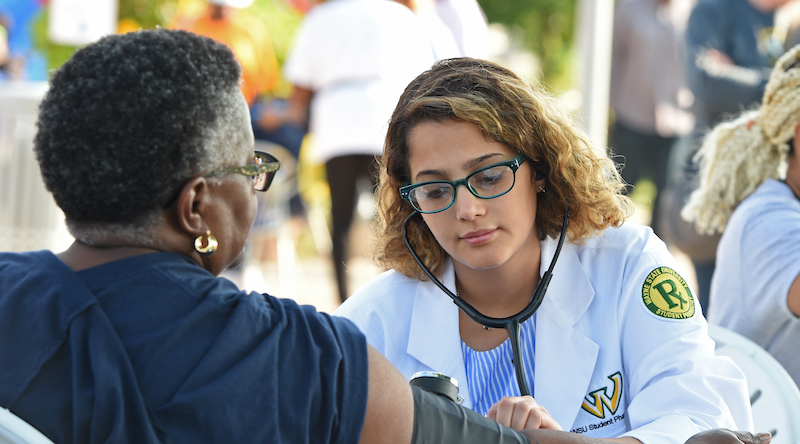Ambulatory Care Concentration
The Wayne State University Ambulatory Care Concentration (ACC) is a selective clinical pharmacy-intensive concentration within the Eugene Applebaum College of Pharmacy and Health Sciences PharmD Program that aims to provide pharmacy students with a focused experience in ambulatory care.
Coursework and timeline How to apply

An ambulatory care pharmacist usually practices as a member of an interprofessional healthcare team to improve patient outcomes, lower healthcare costs and improve the patient experience. They can provide comprehensive medication management for a wide variety of patients with chronic health conditions. It is common for ambulatory care pharmacists to practice under a collaborative practice agreement, enabling them to initiate/adjust/discontinue medications, order and monitor laboratory studies, and perform limited physical assessments. Additional roles may include: development, implementation, and evaluation of patient care services; public health initiatives; coordination of care; patient advocacy; wellness and health promotion; triage and referral; transitions of care; patient adherence; and patient education.
PharmD students in the ACC will receive focused training in and increased exposure to ambulatory care pharmacy to enhance their professional education, further their interest, and prepare for a career in the field. Students will receive hands-on experience in applying contemporary clinical and administrative topics in ambulatory care. Upon completion of the program, students will obtain a concentration in ambulatory care, to be noted on their transcript upon graduation. The experience gained in the ACC is expected to differentiate students from their peers who plan to apply to post-graduate residencies, fellowships, or graduate degree studies. Furthermore, PharmD graduates with an ACC will gain knowledge and training that will facilitate moving the profession of pharmacy forward through ambulatory care.
Admission requirements
PharmD students admitted to the WSU Doctor of Pharmacy program must submit applications to the ACC by December 1 of their P2 year. Application requirements include:
- Cumulative undergraduate GPA of 3.0 or higher in the PharmD Program at the time of application
- Essay describing interests and career goals relating to ambulatory care (500 words maximum)
- Updated curriculum vitae, unofficial undergraduate transcripts, and unofficial pharmacy school transcripts
- Ranked list of elective options from the approved ACC coursework
Admission timeline
In the fall of the P1 year, the ACC will be introduced during the elective information session (P1 extended orientation). P2 students are also invited and encouraged to participate in this information session if a refresher is desired. During the fall P2 semester, students interested in applying to the ACC should discuss their elective preferences and planning with their faculty advisor. The ACC application is due on December 1 of the P2 year, and students will be notified of acceptance in the winter P2 semester. Students will apply online following the admission requirements outlined above.
Structure and overview
The ACC program coordinator(s) will facilitate the application process. The ambulatory care faculty within the PharmD Program will serve as a working group and will review submitted applications. Only students who have submitted a complete application will be evaluated for admission into the program. Each year, it is projected that approximately 10 students will be selected for admission. Program capacity will be re-evaluated annually.
Students within the ACC will be required to successfully complete a total of 17 credit hours with a focus in ambulatory care (9 didactic and 8 experiential credit hours). See coursework outline and timeline below. The concentration will begin with an orientation. Subsequently, students will participate in Medication Therapy Management (MTM) training in the S/S following the P2 year. Once all requirements have been satisfied, students will obtain an MTM certificate. Students in the ACC will complete 2 ambulatory care electives (2 designated didactic electives OR 1 designated didactic elective + 1 directed study in ambulatory care), 2 mandatory didactic courses (PPR 6155 and PPR 6740), and 2 Advanced Pharmacy Practice Experience (APPE) rotations in ambulatory care. Qualifying rotations must be either designated as Ambulatory Care or Community Clinical. Research is not a mandatory component of the concentration; however, it is encouraged.
Approved coursework and APPE rotations within the ACC must have ≥60% of course content in ambulatory care pharmacy. The criterion for this content is based on the Board-Certified Ambulatory Care Pharmacist domains and can be any combination of them: patient centered care, translation of evidence, and advancement of practice. All ACC coursework will be counted toward meeting required PharmD elective credit hours and in turn, completion of the PharmD degree a with concentration in ambulatory care.
Ambulatory care involvement
Students in the ACC concentration will also be expected to participate in any PharmD Program initiatives and/or volunteering in ambulatory care pharmacy. Co-curricular involvement is also expected. Students in this concentration are expected to join and seek leadership positions in at least one of the following organizations:
- American College of Clinical Pharmacy, Ambulatory Care (Student) Practice and Research Network
- American Society of Health-System Pharmacists, Section Advisory Group on Ambulatory Care Pharmacotherapy
- American Pharmacists Association
- Academy of Managed Care Pharmacy
- Diabetes Education and Wellness Clinic
P4 students in the ACC concentration will serve as mentors to P3 students in the concentration.
ACC coursework and timeline
| Date | Year | Activity | Course # | Credit Hours(ACC Specific) |
| Fall | P1&P2 | Introduction to ACC as an Elective Option during the Elective Information Session | ---- | ---- |
| December 1 | P2 | --- | --- | |
| January | P2 | Notification of ACC Program Admission | --- | --- |
| Spring/Summer | P3 | ACC OrientationMedication Therapy Management Certificate Training Program | --- | --- |
|
|
| Designated ACC Electives2 of the following designated didactic electives OR 1 designated didactic elective AND 1 directed study in ambulatory care *List subject to change year to year based on availability/approval* The following designated ambulatory care elective list meets the criteria outlined above of ≥ 60% AC content. | --- | 4 |
| Spring/Summer | P3 | Principles of Pain Management Psychiatric Pharmacy | PPR 6590 PPR 6550 |
|
| Fall | P3 | Anticoagulation Management Managed Care Elective | PPR 6580 TBD |
|
| Winter | P3 | Pharmacotherapeutics of Diabetes Mellitus | PPR 6720 | |
Mandatory for all ACC students | ||||
| Fall | P3 | Social Administrative Sciences and Professional Development V: Pharmacy Practice Development | PPR 6155 | 3 |
| Winter | P3 | Ambulatory Care Elective | PPR 6740 | 2 |
|
|
| Advanced Pharmacy Practice ACC Rotations2 rotations in Ambulatory Care must be completed as scheduled by the Experiential Education Committee |
|
|
| S/S-Winter | P4 | Ambulatory Care APPE | --- | 4 |
| S/S-Winter | P4 | Ambulatory Care APPE OR Community Clinical* | --- | 4 |
| Graduation | P4 | Receive Doctor of Pharmacy degree with a concentration in Ambulatory Care | --- | --- |
| Total |
| Credits specified for ACC |
| 17 |
*Ambulatory Care rotations may be scheduled across multiple health systems
 Susan Davis
Susan Davis